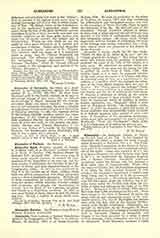

Alexander of Lycopolis, the writer of a short treatise, in twenty-six chapters, against the Manichaeans (P.G., XVIII, 409-448). He must have flourished early in the fourth century, as he says in the second chapter of this work that he derived his knowledge of Manes’ teaching Greek: apo ton gnoromon (from the man’s friends). Despite its brevity and occasional obscurity, the work is valuable as a specimen of Greek analytical genius in the service of Christian theology, “a calm but vigorous protest of the trained scientific intellect against the vague dogmatism of the Oriental theosophies”. It has been questioned whether Alexander was a Christian when he wrote this work, or ever became one afterwards. Photius says (Contra Manichaeos, i, 11) that he was Bishop of Lycopolis (in the Egyptian Thebaid), but Bardenhewer opines (Patrologie, 234) that he was a pagan and a platonist.
JOHN J. A’ BECKET.

